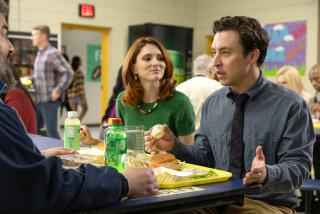‘CHIPS’ AND BROKAW: CLASSES FAR APART
Goodbye, Mr. Brokaw; hello, Mr. Chips.
NBC News and Tom Brokaw examine the role of America’s teachers in a shallow documentary at 10 p.m. Monday on Channels 4, 36 and 39. It’s called “To Be a Teacher.”
You’ll get far more insight into teaching, though, from a three-part “Masterpiece Theatre” offering of “Goodbye, Mr. Chips,” James Hilton’s story about a kindly British schoolmaster whose long career straddles the 19th and 20th centuries.
Premiering at 9 p.m. Sunday on Channel 28 and continuing the next two Sundays, the appealing BBC production starts slowly, but like Chips himself, gets better and better.
In this case, the fiction holds more truth than the reality.
NBC’s reality is New Jersey’s Toms River High School East, where the network roams the halls and classrooms, stating and restating the obvious: Teachers are important, underpaid and undervalued.
As math teacher Leon Stanziano notes: “Taxpayers want a great education. They want everything for their kids, but they don’t want to pay for it. Why? I’ve never been able to understand that.”
Unfortunately, the program doesn’t attempt to explain “that.”
In interviewing a few elite teachers and some students (along with showing endless classroom shots of bored kids), Brokaw and producer/director/co-writer Tom Spain deliver the predictable. They regurgitate platitudes and do lots of handwringing.
NBC is not very illuminating or deep here. Trailed by a camera, for example, Brokaw enters a classroom like a general about to review his troops. He ticks off the kind of facile questions that are sure to draw superficial answers: “So why are you here?” “Do you hate it?” “Hate math?”
At one point he nears self-parody by interviewing two schoolgirls in what appears to be a lavatory, by the towel dispenser.
Why is Brokaw the reporter so visible on this program, anyway? Why is he continually on camera as if the hour were devoted as much to him as to teachers? Why? For the same reason that he is the focus of all the glossies that NBC sent out to publicize “To Be a Teacher.” It’s another lesson in celebrity journalism.
The hour probably doesn’t even approximate the teaching experience. How could it?
A famous anchorman and camera crew stroll the hallways and pop into classrooms. Are we to believe their presence doesn’t alter routine and distort reality? Are we to believe that, in one case, kids who are identified as undisciplined will not be even rowdier with an NBC crew in their midst?
What “To Be a Teacher” does do effectively is individualize teaching and celebrate exceptional teachers. One of them is Stanziano, who is a metaphor for society’s underthanked teacher corps. As sole support for his pregnant wife and three children, he works part-time in a liquor store to supplement his $25,000 teaching salary. His wife regards teaching as an honorable calling, but reveals that when her sister considered becoming a teacher, her family said, “Don’t!”
Stanziano is one of those unusual teachers who make a difference, one able to touch and inspire students despite having to hold down two jobs to make ends meet.
Teachers with special gifts, and those who persevere despite obstacles, are a great national resource. Krista McAuliffe, the teacher/astronaut who died in the fiery Challenger explosion, immediately comes to mind because TV was there to witness her tragic end.
But Stanziano reminds me of another teacher I knew briefly. Bill Belcher taught math and was an assistant coach in my daughter’s high school. He was kind, understanding, patient and truly beloved.
Belcher made extra money by tutoring students individually. That’s what he was doing one night in 1985, at the home of one of my daughter’s friends, when he suffered a fatal coronary. When he died, at age 43, the entire school mourned.
Belcher was in some ways a modern Mr. Chips. He surely would have agreed with Chips that a teacher’s purpose is “to draw out from people their full capacities.”
Author Hilton patterned Chips after his schoolmaster father. A product of another age and environment, Chips faces a different world than Leon Stanziano, Bill Belcher, Krista McAuliffe and all the others, but has similar teaching challenges.
Played to the endearing hilt by Roy Marsden, Chips rises from a bumbling teacher in the 1880s to become an institution at a 400-year-old sniffy school for boys. Generation after generation regard this somewhat-musty-but-inspired educator as a father figure.
All is not quiet on the academic front. Old Chips must endure a tragic personal loss. And much later a new, Prussian-like headmaster questions Chips’ patriotism for advising students that both sides have a case in Britain’s war with the Boers in southern Africa.
“Brookfield is not here to sell knowledge like bags of sugar,” Chips bristles. “It is here to bring up boys to become thinking, honorable, useful men who heed the word of God and the voice of conscience.”
Chips cherishes reason and compassion. He befriends the school’s German teacher, a young man from Weisbaden who vacations in his homeland as the clouds of World War I gather over Europe. You know that the German will not return to the school, that he and the boys that Chips watches march off to fight the Hun are destined to join Siegfried Sassoon’s “citizens of death’s gray land.”
Hence Chips outlives many of his students, dying at 85, an anachronism in a 1930s world growing grimmer by the moment. “If I haunt you when I’m gone,” he tells his colleagues when he retires, “just think of me as a friendly ghost.”
Chips . . . Belcher . . . McAullife. There is more than one friendly ghost--reassurance for 1987.
More to Read
The complete guide to home viewing
Get Screen Gab for everything about the TV shows and streaming movies everyone’s talking about.
You may occasionally receive promotional content from the Los Angeles Times.






